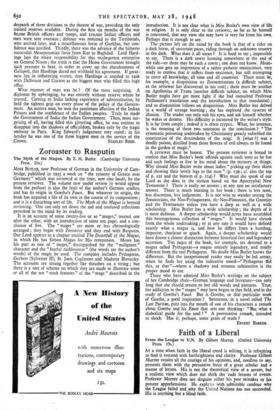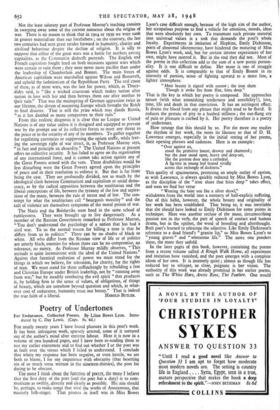Faith of a Liberal
AT a time when faith in the liberal creed is wilting, it is refreshing to find it restated with forthrightness and clarity. Professor Gilbert Murray retains all the courage of his opinions, and, needless to say, presents them with the persuasive force of a great scholar and a master of letters. His is not the theoretical view of a savant, but a realistic view which does not shirk the rude lessons of events. Professor Murray does not disguise either his past mistakes or his present apprehensions. He explains with admirable candour why the League failed and why the United Nations has not succeeded. His is anything but a hIind faith.
Not the least salutary part of Professor Murray's teaching consists in sweeping away some of the current nonsense about the origins of war. There is no reason to think that in 1914 or 1939 we were sunk in grosser materialism than our forefathers ; on the contrary, the last two centuries had seen great strides forward in humanity, charity and civilised behaviour despite the decline of religion. It is silly to suppose that either of the great wars was a battle for markets among capitalists, as the Communist dialectic pretends. The English and French capitalists fought hard on both occasions against wars which were certain to ruin them ; they were never more pacifist than under the leadership of Chamberlain and Bonnet. The main forces of American capitalism were marshalled against Wilson and Roosevelt, and upheld the isolationism of the Republican Party. The real cause of these, as of most wars, was the lust for power, which, as Thucy- dides said, is "like a wicked courtesan which makes nation after nation in love with her and then betrays them one after another to tfieir ruin." That was the mainspring of German aggression twice in our lifetime, the dream of mastering Europe which brought the Reich to final disaster. That is still the prize which may dazzle Russia, "as it has dazzled so many conquerors to their ruin.". From this realistic diagnosis it is clear that no League or United Nations is of any value unless it is designed and equipped to prevent war by the prompt use of its collective forces to meet any threat to the peace or to the security of any of its members. To gather together for regulating currencies or suppressing the opium traffic, while leav- ing the sovereign right of war intact, is, as Professor Murray says, "in fact and principle an absurdity." The United Nations at present offers no collective security. It has failed to agree on the organisation of any international force, and it cannot take action against any of the Great Powers armed with the veto. These disabilities would be less disturbing were the Great Powers agreed upon the principles of peace and in their resolution to enforce it. But that is far from being the case. They are profoundly divided, not so much by the ideological clash between Communism and capitalism or social demo- cracy, as by the radical opposition between the totalitarian and the liberal conceptions of life, between the tyranny of the few and aspira- tions of the many, between the rule of terror and of law. The con- tempt for what the totalitarians call "bourgeois morality" and the cult of violence are themselves symptoms of the moral poison of war.
The Nazis and the Bolsheviks were bred in the same school of ruthlessness. They were brought up to live dangerously. As a member of the Russian Government remarked to Professor. Murray, "You don't understand the psychology of a nation that has had a civil war. To us the normal reason for killing a man is that he differs from us in politics." There can be no shades of black or white. All who differ from the Russian view of life or of politics are utterly black, enemies for whom there can be no compromise, no tolerance, no mercy. As Professor Murray mildly observes, "This attitude is quite inconsistent with the ideal of the United Nations." Against that fanatical exaltation of power we must stand for the things in which we believe, for toleration, for charity, for the rights of man. We must stand for them unflinchingly by rebuilding a free and Christian Europe under British leaderhip, not by "running away from war," but by steadily combating the evil spirit "that produces it, by holding firm to the sense of values, of obligations, of things of beauty, which are somehow beyond question and which, at what- ever cost of endurance, humanity must not betray." That is indeed































 Previous page
Previous page